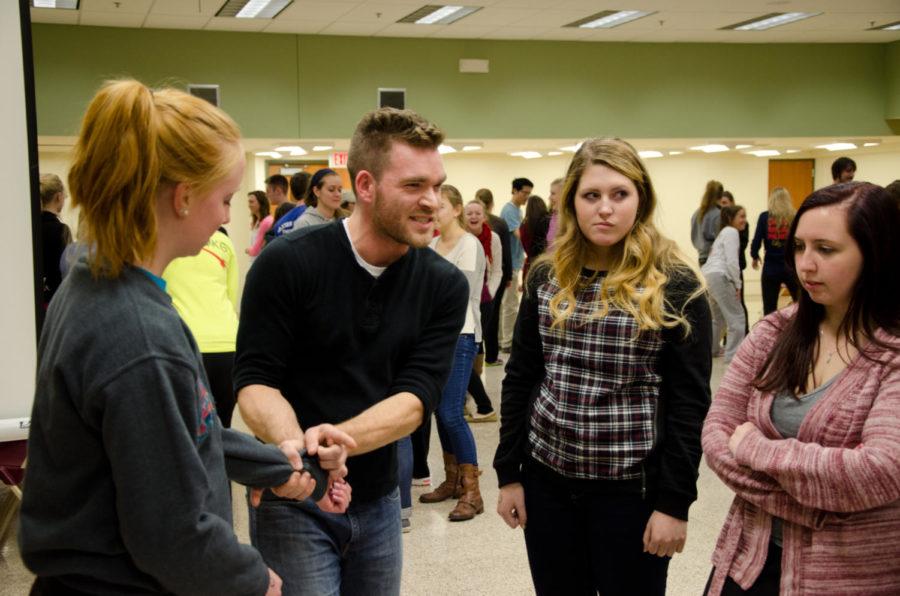Martial Arts Club teaches sexual assault self-defense
Hanna Peters, a freshman in apparel merchandising, practices a self defense move with Theodore Westhues, an Iowa State University graduate. The Cyclone Martial Arts Club taught self defense techniques at a fundraiser for ACCESS at St. Thomas Aquinas Church on Nov. 11.
November 12, 2014
A group of students is working to cut down sexual assault through martial arts.
A group of students in Communication 317, Small Group Communication, used a class assignment to draw attention to sexual assault and to fundraise money for the Adult Care Center Extending Shelter and Service, or ACCESS, on Tuesday.
Brynn Hansen, senior in community and regional planning, and her group partnered with the Iowa State Martial Arts Club to hold a self-defense seminar at their fundraiser.
“We wanted to pick something close to home,” said Hansen.
1 out of 4 women and 1 out of 30 men will be the victim of a sexual assault at some point in their lives.
Sexual assault isn’t foreign to Iowa State’s campus. This semester, two sexual assault cases have been reported to authorities.
Tim Sklenar is a graduate student in sustainable agriculture and the education chair for the Cyclone Martial Arts Club. Sklenar and his wife Sarah Carney lead self-defense seminars alongside members of the Cyclone Martial Arts Club.
Sklenar said that he began teaching self-defense seminars and educating others on sexual assault because he wanted to dispel myths regarding sexual assault. He said that past courses sometimes placed the blame of sexual assault on the victim, which caused them to blame themselves and Sklenar said that attitude is detrimental.
Carney said that 90 percent of sexual assaults are committed by someone that the victim knows. When a sexual assault is committed by someone that the victim knows, it begins to happen in small ways such as crossing boundaries, she said. Based on that statistic, Carney and Sklenar teach resistance tactics to instill confidence in those that partake in self-defense seminars.
“If it’s someone you know you don’t always want to go straight to breaking a leg,” Carney said. “When we fight back we aren’t increasing our risk [of being sexualy assaulted].”
While leading seminars, Sklenar and Carney demonstrate defense techniques following three basic concepts: verbal, such as shouting, screaming or demanding space, fleeing such as running or leaving the situation and physical force such as utilizing pressure points, pushing, striking or fighting back.
After Carney and Sklenar demonstrate how to successfully perform techniques, they give attendees opportunities to practice alongside members of the martial arts club.
The members of the martial arts club are given small groups of students to work with to help them perfect the techniques that they are shown by Carney and Sklenar. Students are able to practice things such as grabbing, stomping and screaming in their small groups.
Sklenar is confident that people can do certain things to prevent being victimized such as being aware of surroundings and always going with a gut feeling.
“It’s never the victims fault. The only person that can prevent an attack is the perpetrator,” Sklenar said.
Another thing that Sklenar and Carney promote in their seminars is consent. Together they say that if a yes has not been given, it is not consensual. Sklenar also said that if a person is under the influence of alcohol or drugs than proper consent cannot be given.
“Consent it never assumed. It’s never implied,” Sklenar said.

















